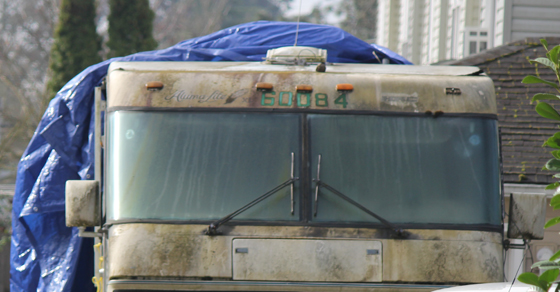It’s no secret that I have felt out of place in the Portland metro area where I live. I’m a Montana boy in a big city, and after living here for 17 years, I still fight the culture shock—and the fact that despite my wish to live elsewhere, I seem to be right where God wants me.
I crave peace, quiet, and elbow room, all of which are virtually nonexistent in my densely packed neighborhood with its traffic-clogged streets. And the neighborhood is visibly deteriorating.
My inner turmoil reached critical mass recently as I walked my dogs. It’s a beautiful time of year, but I couldn’t enjoy the warm sun or budding flowers. I didn’t even notice them.
Instead, I was flooded with an overwhelming sense of disgust. It wasn’t because anyone had wronged me. It was about aesthetics.
My whole neighborhood looks like a junkyard.
I live on a small flag lot, wedged in behind some other houses, and the neighbor in front of me recently parked a decrepit old 24-foot travel trailer with covered windows in his back yard. So this eyesore now fills my view from my front porch. I think he is renting it out. I hope he’s not doing something worse.
As I passed his trailer and walked down my driveway, I noticed the neighbor across the street has followed suit with his own travel trailer—only far bigger, grimier, and uglier than the first. Again, I hope he is just renting it out, but I suspect he is doing more.
 Another neighbor has started up an auto repair shop in his home garage. And business must be really good because both sides of the street are packed with broken-down vehicles in need of a mechanic. Since my street has no sidewalk, all of the parked cars leave no place to walk except in the street itself.
Another neighbor has started up an auto repair shop in his home garage. And business must be really good because both sides of the street are packed with broken-down vehicles in need of a mechanic. Since my street has no sidewalk, all of the parked cars leave no place to walk except in the street itself.
Finally, I witnessed a drug deal. Unfortunately, our neighborhood is dotted with drug houses (and maybe trailers). People park, run up to a porch, and exchange cash for packets of goods. Then they get back in their cars, drive around the corner, and light up their pipes. My other neighbors have reported seeing this activity too, but it is not easy to document all the evidence required to stop it.
The longer I walked, the angrier I became. I was angry at my neighborhood and everyone in it. I could see that the whole place is going to seed, and I just wanted to get home, shut the curtains, and pretend I live someplace else.
But for now God has me here.
True, I may have legitimate concerns about the people who live around me. I could call their landlords or other authorities and report evidence that they are subletting their trailers (which, on these rental properties, I suspect is illegal), starting an auto repair business in a private garage (which, in this residential zone, almost surely is), and making drug deals (which definitely is). And I don’t think it is wrong for Christians to support what is good in our neighborhoods, and push back against the bad.
But this time, I realized after my walk, perhaps I’m called to “love my neighbor” in a different way.
As my anger cooled toward my unneighborly neighbors, I began to identify with the disciples James and John. These two “sons of thunder”— offended by some similarly unneighborly Samaritans—asked: “Lord, do you want us to call fire down from heaven to destroy them?” (Luke 9:54) – as if they themselves actually had the power to do so. But in response to this grandiose and vengeful suggestion, the Bible says Jesus rebuked them (Luke 9:55). We don’t know what he said, but I’m sure it was sharp. In their arrogance and pettiness, they completely missed Jesus’ whole message of love and grace.
Then I thought of Peter—who, when commanded in a vision from God himself to eat “unclean” animals lowered down in a sheet, boldly declared, “Surely not, Lord! I have never eaten anything impure or unclean (Acts 9:14).” To Peter’s haughty statement, God replied: “Do not call anything impure that God has made clean (v. 15).” Similarly, God seemed to be showing me a vision, too, about how he sees people—not as clean or unclean, but as lost or found.
These scriptures are just another reminder that the big picture, the Story, is not about me and my concerns. It is about God and his.
So, with hat firmly in hand, I took some time to reflect on my response to my neighborhood, and four personal mistakes that keep me from loving my neighbor.
Mistake #1: I fail to remember that there’s no escaping the corporate effects of sin. Sin is collective; each person’s sin affects everyone else—maybe not immediately or directly, but corporately. All sin affects humanity as a whole, and no place on earth is untouched by the fallout. In a cleaner, wealthier community the specific sins might look slightly different, but they are still there. So even if I move to a different neighborhood, a different town, or a different country, I can never escape the “junkyard” created by sin. Our job is not deny or ignore the sin all around us (and inside us), but to join Jesus in healing it.
Mistake #2: I see my neighbors through a “me vs. them” lens. It’s easy for me to look down on my neighbors because what they are doing disgusts me and makes me uncomfortable. But the Lord never tolerates that attitude in his followers. He soundly corrected Peter, James and John for looking down on their neighbors—because his focus is loving one’s neighbor. In a “me vs. them” mentality, love for my neighbor is often the first thing to go.
Mistake #3: I don’t see my neighbors through God’s lens. The houses and apartments around me are filled with people whom God loves just as deeply as he loves me, and many of them are dealing with far greater challenges and far fewer opportunities than I. Am I more concerned about my own comfort than about the souls in those homes? In the entire scheme of things, the universe doesn’t revolve around me and what I judge to be disgusting. My neighbors and their problems are more important than my prim sense of aesthetics. Maybe I’m being called to remember that God seeks not to condemn all of these people, but to save them (John 3:17).
Mistake #4: I forget that even if I try to run away, the common denominator is me. Sometimes I delude myself into thinking that I “have it all together.” But the truth is, in the same way that I have felt disgusted by my neighbors, they could just as easily feel disgusted by me—because like them, I am filled with brokenness and sin which often hurts others. So some of my disgust is caused by my own sinful attitudes and responses—not theirs—because wherever I go, all of that baggage goes with me.
Jesus loved my neighbors enough to die for them. They are neither good nor bad; they are just lost. Maybe one day I will live somewhere else. But if I can’t learn to reflect Jesus right here, right now, in this time and place, it’s a good bet I won’t be able to reflect him in any other.
Leave a Comment



 It’s been years since the start of this journey.
It’s been years since the start of this journey.